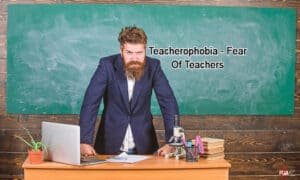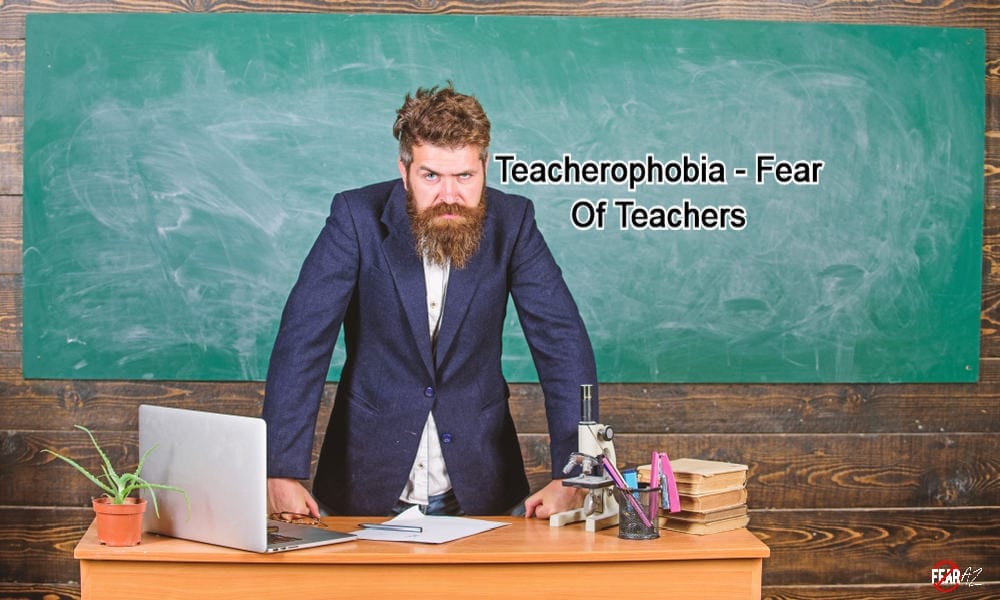Share This Article
Let’s Learn More about Teacherophobia
Everyone, at some point in their lives, has experienced being afraid of a teacher. But if this fear goes beyond the usual anxiety of being in school and starts making you anxious and panicked, it’s cause for concern.
Does thinking back to your school days fill you with dread? Do you feel anxious when around teachers or other persons of authority in the educational field? If you’re in school, do you find yourself skipping class or avoiding talking about certain subjects?
All of these are signs you may be dealing with teacherophobia, also called pedagophobia, which is the fear of teachers.
This phobia causes a person to become afraid of teachers, either all teachers or one particular teacher, so much so that they are afraid of even talking about them. When this phobia manifests in children, they will want to avoid school at all costs and may fake illness or use other tactics to avoid going to school. But adults can also develop a fear of a teacher or teachers later in life.
Fortunately, there are ways to combat this phobia. Once you acknowledge your fear is irrational, you can try different treatment methods to slowly but surely overcome your pedagophobia.
What Is Teacherophobia?
Teacherophobia or pedagophobia is an irritational fear of teachers. Someone with this phobia is scared of teachers or other authority figures in the educational field, such as the principal.
Teacherophobia is related to scolionophobia (the fear of school) and sophophobia (the fear of studying or learning). In this phobia, the individual is afraid of facing a teacher.
A child with this phobia may get physically sick when forced to go to school. They may spend more time at home rather than at school, which can affect their education. A child may be afraid of just one teacher who they feel is too strict or asks a lot of questions, or they may fear teachers in general.
Unfortunately, many parents disregard this behavior as laziness or stubbornness and fail to get their child help. This phobia can then affect the child’s mental health as well as academic progress.
In adults, pedagophobia may not affect their academic progress, but it can still affect their everyday lives.

Causes of Teacherophobia
The exact cause of any phobia is undefined, and the exact trigger for everyone is different. It is usually a combination of different factors such as genetics, environment, and past experiences.
For example, someone who had a traumatic experience with a teacher, such as experiencing verbal or physical abuse, is at a higher risk of developing a fear of teachers.
Living with or knowing someone with an anxiety disorder can also lead to an individual developing certain thought patterns that result in a phobia.
Genetic predisposition also plays an important role in developing teacherophobia. If you have someone in your family suffering from mental issues, you are at higher risk of developing this or any phobia.
Symptoms of Teacherophobia
Symptoms vary from one person to another, although most symptoms are similar to other anxiety disorders and phobias. Depending on the severity of the phobia, a person may experience extreme or mild symptoms.
Here are some of the most common symptoms of teacherophobia.
Physical Symptoms
- Sweating
- Trembling
- Increased heart rate
- Increased blood pressure
- Palpitations
- Headache
- Gastric distress
- Tightening of chest
- Diarrhea
- Fever
Mental/Emotional Symptoms
- Anxiety
- Panic attack
- Anger
- Clinginess
- Nightmares
- Irritability
Treatment of Teacherophobia
Like with all the phobias that exist, there is no one specific cure for teacherophobia. However, there are various treatment plans, including self-help, that can help you deal with the symptoms and even overcome your phobia.
Self-Help Techniques
You can learn to deal with your phobia on your own using various self-help methods. Meditation, deep breathing, and yoga are all known to help ground you. These techniques can help you deal with the anxiety that comes with any phobia.
However, in the case of teacherophobia, children are more prone to developing this fear. So, it’s important for parents to step in and help them overcome their phobia.
Here are a few tips parents can try:
- Calmly talk with your child and encourage them to open up about their phobia
- Assure them that you are not going to get angry at them or ridicule their fear
- Boost their self-esteem
- Help them realize that a teacher can be a trusted figure and not one to be feared
- Talk with them to understand whether they’ve had any problematic experiences with a teacher
- Help them with their schoolwork
- Get them started on self-help techniques like relaxation techniques and meditation
- Talk with the authorities at school and take cooperative steps to make their journey easier
- Seek out therapy for your child so they can be guided by certified professionals
Professional Treatment
A professional therapist will help those with this fear to acknowledge the phobia, recognize triggers, and equip them with specific tools to manage the fear.
A mental health professional may try one or more of the following therapies:
- Cognitive behavioral therapy
- Exposure therapy
- Dialectical behavior therapy
In rare cases, the doctor may even use medications for some time. These medications help the patient deal with panic attacks or anxiety symptoms and are not a cure for the phobia.
Coping with Teacherophobia
A teacher is someone who can often have a significant impact on an individual’s growing years. But for a child struggling with teacherophobia, the classroom can become a battleground where they are losing the battle. Even adults dealing with teacherophobia can develop a negative relationship with teachers and the education system.
It’s important to acknowledge this fear, especially in the case of children, and not dismiss it. You can talk with them and guide them to professionals who will help them overcome their fears. These simple steps may help your child develop healthy relationships with their teachers and education.
Conclusion
Teacherophobia can not only affect an adult’s social life, but it can also get in the way of a child’s education. Though adults have the ability to tend to their own needs, children suffering from teacherophobia need the support of their parents. Children may even need professional support to overcome their fear. With some time and effort, they can overcome this phobia and develop a positive relationship with their teachers.



